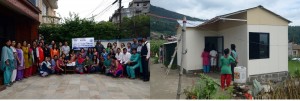
The company we keep
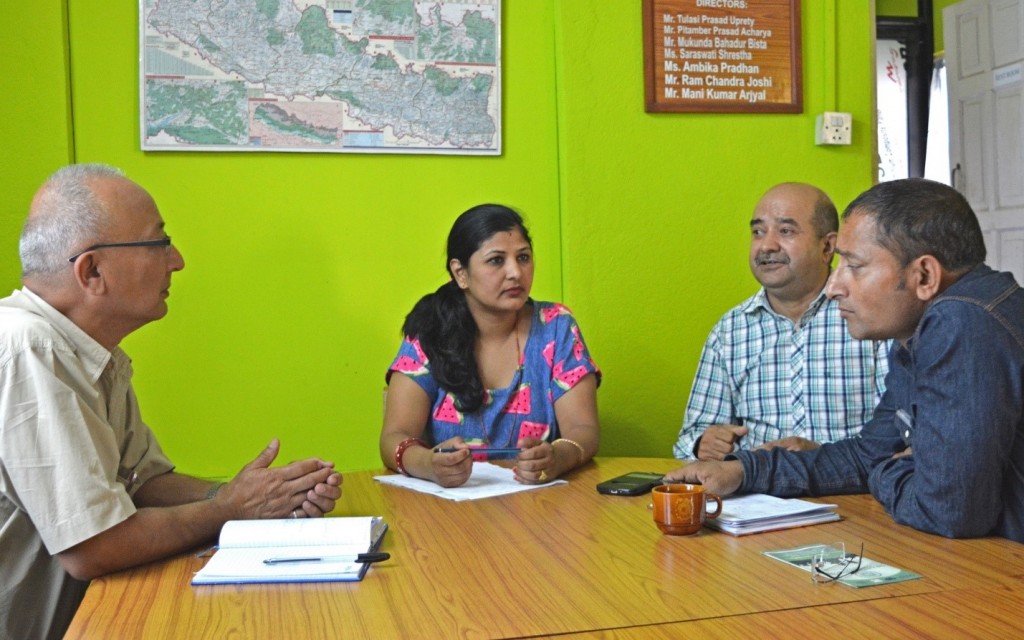 Harihar Acharya (CEO), Menaka Bhattarai (Admin & Finance Officer), Naresh Nepal (DCEO), and Rudra Parajuli (Senior Training Officer) discuss upcoming training schedule in Pokhara.
Harihar Acharya (CEO), Menaka Bhattarai (Admin & Finance Officer), Naresh Nepal (DCEO), and Rudra Parajuli (Senior Training Officer) discuss upcoming training schedule in Pokhara.
On the outskirts of Kathmandu city, one can find a lime-green building with a placard that says “Centre for Microfinance (CMF), Nepal”. It is in this building where I volunteer to develop standards and systems for implementing fund development and communication strategies. Through my work, I am able to enhance CMF’s ability to promote micro-finance services as a tool to escape poverty. CMF Nepal places particular focus on the development of women and excluded groups and enhances service delivery capacity of development partners (banks, micro-finance institutions, etc...) that promote the micro-finance sector.
Working closely with colleagues, I have so far facilitated the development of the following items: written an organizational briefer; created databases for organizational project comparison and fund development; created a template for a partnership profile report; created a database for donor tracking activity; written project proposals; created an organizational brochure; trained staff on social media communications and marketing; captured photographs to publish photo-essays on CMF Nepal’s Facebook page; and worked with website developer to design two micro-finance websites.
Originally, CMF Nepal began as a pilot project implemented by CECI. In 2000, CMF Nepal became an autonomous, privately owned national network organization that works to strengthen the micro-finance sector and its member associations, institutions and individuals with a vision of “sustainable access to micro-finance services for the poor”. – Carlo Valle
Banking on it
“We’ll start early tomorrow morning as it takes two hours by dirt road to get to the ceremony site.” my counterpart, Ankur, informs me. Happy but tired, I lay in bed after an exhausting 13-hour journey to Nepalgunj in the Terai plains of Nepal. The next day, we were going to Rajapur to participate in a “handing over” ceremony and to celebrate Sana Kisan Bikas Bank Ltd.’s (SKBBL) milestone achievement of providing microfinance to the entire district of Bardiya.
Established in 2001, SKBBL is a wholesale microfinance bank with a successful model of creating and working closely with Small Farmers Agricultural Co-operatives (SFACLs). A “handing over” ceremony signifies that the staff of the SFACL is ready to take on managing their own operations and is a vital step to ensuring that financial welfare and ownership is returned to the small farmers. SKBBL has grown rapidly in the past 15 years and has an outreach of approximately 600 SFACLs in 60 districts in Nepal. Almost 500,000 farmers receive microfinance from the bank and with such rapid success, SKBBL is looking for ways to improve their internal operations and support their long term goal of expansion to all districts in Nepal.
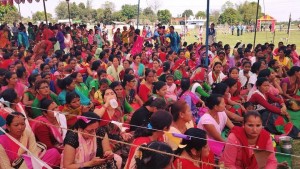

Enter an IT Advisor, from Canada, who thinks technology can be used to both directly or indirectly improve the lives of the rural poor. Thanks to the Uniterra program, I am working with Ankur Mainali, SKBBL’s IT administrator, to develop and implement an IT Strategy that supports SKBBL’s current and future business priorities. Our goal is to ensure that SKBBL can begin to operate more efficiently so that continued growth and outreach will be achieved. And with a little help from the Nepalese gods, there will be many more success stories like those heard from the small farmers in Bardiya. – Cheryl Chin
Capturing voices
I’ve got Nadia and a ton of camera equipment on the back of a scooty and we’re fighting our way between the horn-honking, black smoke-emitting cargo trucks that populate Ring Road. Nadia’s shouting into her phone, trying to get directions to the office by using landmarks like “the almost finished pedestrian bridge” and "the moto repair place across from the cafe”. With a bit of time and a lot of help, we make our way to Natural Herbs World Pvt. Ltd. where we’re greeted by Prabin Kumar Bastola and Bikram Rai, our two interview subjects for the day.
Nadia and I are creating promotional videos for the executive members of the Nepal Herbs and Herbal Products Association where Nadia works. The best part about this project is how enthusiastic everyone is to share their products, knowledge and story with us. They are so proud of the businesses they have created and their energy is contagious.
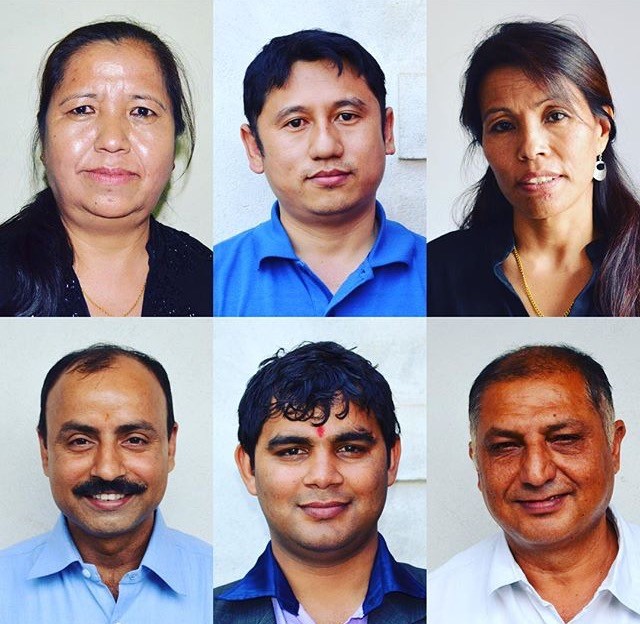
While I’m setting up my camera equipment, testing the light and audio, and preparing my notebook, Nadia is explaining the project, making everyone at ease and convincing them they’ll be naturals in front of the camera. And they are. Prabin tells us the story of how he came to Kathmandu as a young child, too poor to aspire to much other than washing dishes, and selling newspapers. Now he’s the proprietor of his very own business, Panchatatwa International. Hearing his story and seeing the earnestness with which he tells it is a highlight of the day.
That is, until we get Bikram in front of the camera. The guy literally cannot stop smiling and spewing out inspirational phrases like “if you believe in yourself, then you have to do something for yourself. That’s why I started this business”.
It’s young Nepali entrepreneurs like this that I’ve had the great good fortune to work with over the past month or so and it’s been highly rewarding work. Prabin and Bikram are two out of a group of pioneers in Nepal’s herbal industry that are making a go of it and inspiring those around them to do the same! – Paige Mueller
Herbally inclined
My mandate as a Uniterra Volunteer in Nepal represents a wonderful combination between my background experience in international development and business development and my passion for alternative medicine: To support herbal producers, manufacturers and traders to promote and commercialize medicinal plants, essential oils and unique plant-based products from Nepal.
I am working as an Organizational Development Advisor with the Nepal Herbs and Herbal Products Association (NEHHPA), an umbrella organization of over 60 herbal companies throughout Nepal in the sector of non-timber forest products, particularly medicinal and aromatic plants. NEHHPA is committed to increase income opportunities for its members by providing access to new markets, supporting sustainable business practices and promoting Nepal’s high quality herbs and herbal products at the national and international levels.
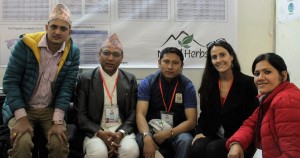
In the past four months my contribution has been mostly in the production of communication and marketing material for the international market, while continuously sharing recommendations with the small team who works hand in hand with NEHHPA’s Executive Committee to bring positive changes for the Nepalese herbal industry.
It has been quite impressive to see how miracles can be done by NEHHPA’s core team of two, organizing workshops in just a couple of days and trade fairs in a couple more. Yubraj ji holds the fort, knowing everything and everyone and implementing Govinda sir’s vision, occasionally with the help of dedicated volunteers like Kiran ji. One of my greatest joys recently has been to see a young woman be selected unanimously as the new Project Coordinator of NEHHPA. It is quite refreshing to see this strong, opinionated woman share her vision and I have faith that Kanchan ji will lead NEHHPA brilliantly, while I head to the field with my talented Uniterra colleague Paige to meet with NEHHPA’s producers and share their stories! – Nadia Roy
All’s Fair
For 25 years Manushi has been at the forefront of the fair trade movement in Nepal, working with local low income artisans in creating quality and traditional handicrafts products to improve their means and livelihoods. They are partnered with 21 producer groups and over 1500 independent artisans in the production of various items from felt and banana fibers to metal works and lokta paper. Their office is also home to their very own tie dye production facility.
Over the last 8 months I have had the pleasure of not only being a part of their office team developing their communication and marketing tools, but have also been fortunate enough to witness the incredible work they are doing for their beneficiaries affected by the 2015 earthquake.
In addition to their commercial operations, they run a micro-credit program to assist and provide women, all over Nepal and in all sectors, with the opportunity to improve their social-economic position. This program to date boast an impressive 22, 000 beneficiaries/members. Through this program they were able to quickly provide relief to their members and producers most strongly affected. They deliver food and supplies to over 150 families within the first few weeks. In April of this year they began the ambitious task of helping rebuild 300 homes in the various districts where there members live. I had the privilege of being able to attend the handover of their first completed home in and also to meet the 90 families in Ratemate whose house are currently under construction. It is heartwarming to see the smiles and hope that they are bringing to people who have lost so much and inspiring to see their commitment to the communities and women of Nepal. – Karl Brown (http://www.manushiarts.com)
